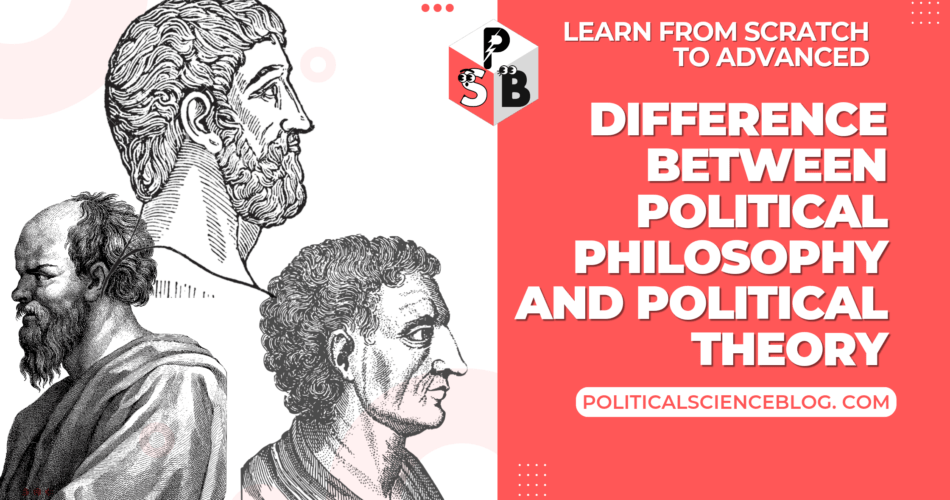‘Political philosophy’ and ‘Political theory‘ are two different but inter-related disciplines that study the nature of politics and the state.
Political philosophy is the branch of philosophy that explores the foundations of political systems and institutions. Political theory, on the other hand, is a branch of political science that studies political concepts, ideas, and practices, and how they shape political systems and institutions.
In this article, we will explore the key differences between political philosophy and political theory, and provide a clearer understanding of what you can expect to learn from each discipline.
What is Political Philosophy?
As we discussed earlier, Political philosophy is a branch of philosophy that has been concerned with questions about the state, government, justice, and the relationships between individuals and the state.
Political Philosophy is the study of the basic principles and concepts that underlie political systems and institutions. Political philosophers seek to understand the nature of the state, the role of government, and the principles of justice that should govern political systems and institutions.
Political philosophers consider the moral and ethical foundations of political systems, and explore how these systems can be structured to promote the common good. They consider questions about the nature of power, the distribution of resources, and the relationships between individuals and the state.
Some of the key thinkers in the field of political philosophy include – Plato, Aristotle, John Locke, Immanuel Kant, Thomas Hobbes and Jean-Jacques Rousseau.
| Philosopher | Major Works |
|---|---|
| Plato | The Republic |
| Aristotle | The Polity |
| John Loke | Two Treatises of Government (1689) |
| Immanuel Kant | Critique of Pure Reason (1781), Critique of Practical Reason (1788), Critique of Judgment (1790) |
| Thomas Hobbes | Leviathan |
| Niccolo Machiavelli | The Prince |
| Jean-Jacques Rousseau | The Social Contract (1762) |
Each of these philosophers has contributed important ideas and concepts to the field of political philosophy, and their work is still widely studied and discussed today.
What is Political Theory?
Political theory is a branch of political science that explores the concepts and ideas that shape political systems and institutions.
Political theorists study how these concepts and ideas have been developed over time, and how they have been used to shape political systems and institutions. They also consider how these concepts and ideas continue to shape contemporary political debates and discussions.
Political theorists examine the political ideas and values that have been used to justify the existence of the state, and the distribution of power and resources within the state.
They also study the political ideologies and ideologies of political movements and parties, and how these ideologies have been used to shape political systems and institutions.
Some of the key concepts and theories studied by political theorists include liberalism, conservatism, socialism, feminism, and environmentalism.
Lets take a peek on this major concepts and theories in the below table –
| Liberalism | Liberalism is a political philosophy emphasizing individual rights, equality, and limited government intervention. |
| Conservatism | Conservatism is a political ideology emphasizing tradition, authority, and property rights. |
| Socialism | Socialism is an economic and political ideology advocating for collective ownership and control of the means of production. |
| Feminism | Feminism is a political and social movement advocating for the rights and equality of women in all aspects of life. |
| Environmentalism | Environmentalism is a political and social movement advocating for the protection and preservation of the natural environment. |
These concepts and theories are used to understand the political ideologies of different groups, and how these ideologies shape political systems and institutions.
Differences between Political Philosophy and Political Theory
1. Object of Study
Political philosophy focuses on the underlying principles and concepts that shape political systems and institutions, while political theory focuses on the ideas and ideologies that have been used to shape political systems and institutions.
2. Approach
Political philosophy is more concerned with abstract concepts and principles, while political theory is more concerned with the practical applications of these concepts and principles in shaping political systems and institutions.
3. Historical Context
Political philosophy is more concerned with historical perspectives and the contributions of key thinkers, while political theory is more concerned with contemporary political debates and discussions.
4. Nature of Inquiry
Political philosophy is more concerned with normative questions, such as what ought to be, while political theory is more concerned with empirical questions, such as what is.
5. Methodology
Political philosophy is typically more philosophical in nature, using abstract reasoning and deductive argumentation, while political theory is typically more empirical and scientific, using quantitative and qualitative methods to understand political systems and institutions.

